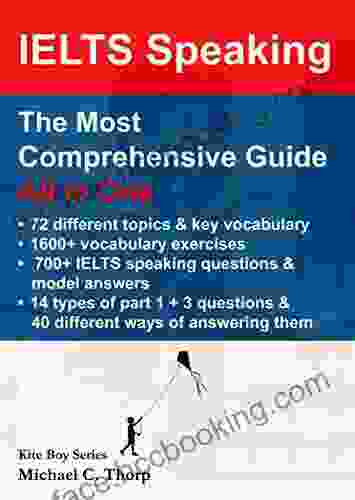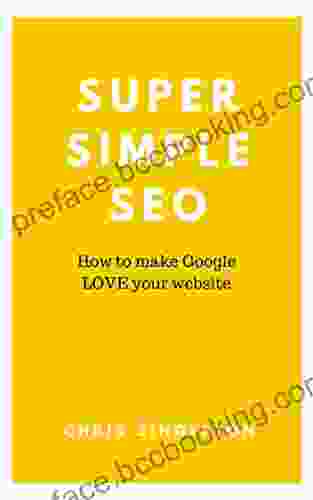How to Make Google Love Your Website: The Ultimate Guide

5 out of 5
| Language | : | English |
| File size | : | 3463 KB |
| Text-to-Speech | : | Enabled |
| Screen Reader | : | Supported |
| Enhanced typesetting | : | Enabled |
| Word Wise | : | Enabled |
| Print length | : | 117 pages |
| Lending | : | Enabled |
If you're a website owner, you know that ranking well in Google is essential for driving traffic and leads. But how do you make Google love your website? It's not as difficult as you might think.
In this comprehensive guide, we'll cover everything you need to know about optimizing your website for Google, from keyword research to link building. By following these best practices, you can improve your chances of ranking higher in search results and getting more organic traffic.
1. Keyword Research
The first step to optimizing your website for Google is to do your keyword research. This means finding the keywords and phrases that people are searching for when they're looking for information, products, or services related to your business.
There are a number of different tools you can use to do keyword research, including Google Keyword Planner, Ahrefs, and SEMrush. Once you've found a few good keywords, you can start to incorporate them into your website's content, title tags, and meta descriptions.
Tip: When you're ng your keyword research, be sure to think about the search intent of your target audience. What are they trying to accomplish when they search for a particular keyword? Are they looking for information, trying to buy something, or something else?
2. On-Page Optimization
Once you've done your keyword research, you need to start optimizing your website's on-page elements. This includes things like your website's code, content, and structure.
Here are some of the most important on-page optimization factors:
- Title tags: Your title tags should be descriptive and keyword-rich. They should accurately reflect the content of your page and be no longer than 60 characters.
- Meta descriptions: Your meta descriptions should be concise and informative. They should provide a brief overview of your page's content and be no longer than 160 characters.
- Headings: Your headings should be clear and keyword-rich. They should help to structure your page's content and make it easy for users to skim.
- Content: Your content should be high-quality and relevant to your target audience. It should be well-written and keyword-rich. It should be easy for users to read and understand.
- Images: Your images should be relevant to your content and be keyword-rich. They should be optimized for web use and be no larger than necessary.
- Code: Your website's code should be clean and efficient. It should be free of errors and be as lightweight as possible.
Tip: It's important to focus on creating high-quality content that is relevant to your target audience. Don't try to stuff your content with keywords. Google can penalize your website for keyword stuffing.
3. Link Building
Link building is one of the most important factors in Google's ranking algorithm. It's the process of getting other websites to link to your website. Links from high-quality websites can help to improve your website's authority and trust.
There are a number of different ways to build links, including:
- Guest blogging: Write guest posts for other websites in your industry.
- Directory submissions: Submit your website to relevant directories.
- Social media: Share your content on social media and encourage others to link to it.
- Broken link building: Find broken links on other websites and offer to replace them with links to your website.
Tip: When you're building links, focus on quality over quantity. A few links from high-quality websites are worth more than hundreds of links from low-quality websites.
4. Technical SEO
Technical SEO refers to the technical aspects of your website that can affect your rankings. This includes things like your website's speed, security, and mobile-friendliness.
Here are some of the most important technical SEO factors:
- Website speed: Your website should be fast and easy to load. Google prefers websites that load in under 2 seconds.
- Website security: Your website should be secure and free of malware. Google penalizes websites that are not secure.
- Mobile-friendliness: Your website should be mobile-friendly. Google prefers websites that are easy to use on mobile devices.
Tip: You can use Google's PageSpeed Insights tool to test your website's speed and get recommendations on how to improve it.
5. Local SEO
If you have a local business, you need to optimize your website for local SEO. This will help your website rank higher in local search results and get more traffic from local customers.
Here are some of the most important local SEO factors:
- Google My Business: Create a Google My Business listing and make sure it's complete and up to date.
- Citations: Get your business listed in local directories and websites.
- Reviews: Encourage your customers to leave reviews for your business on Google and other review websites.
Tip: You can use Google's Local SEO Checker to see how well your website is optimized for local SEO.
6. Content Marketing
Content marketing is a great way to attract new customers and improve your website's ranking in search results. By creating high-quality content that is relevant to your target audience, you can establish yourself as an authority in your industry and build trust with potential customers.
Here are some of the benefits of content marketing:
- Increased website traffic: Content marketing can help you attract new customers and increase your website traffic.
- Improved search rankings: Content marketing can help you improve your website's ranking in search results.
- Established you as an authority: By creating high-quality content, you can establish yourself as an authority in your industry and build trust with potential customers.
Tip: Don't forget to promote your content on social media and other channels to reach a wider audience.
7. Social Media Marketing
Social media marketing is a great way to connect with potential customers and promote your website. By creating engaging content and posting it on social media, you can drive traffic to your website and improve your brand awareness.
Here are some of the benefits of social media marketing:
- Increased website traffic: Social media marketing can help you drive traffic to your website.
- Improved brand awareness: Social media marketing can help you improve your brand awareness and reach a wider audience.
- Increased leads and sales: Social media marketing can help you increase leads and sales.
Tip: Be sure to post regularly and interact with your followers on social media.
8. Paid Advertising
Paid advertising can be a great way to quickly increase your website's traffic and generate leads. By running paid ads on platforms like Google AdWords and Facebook Ads, you can reach a larger audience and promote your website to people who are interested in
5 out of 5
| Language | : | English |
| File size | : | 3463 KB |
| Text-to-Speech | : | Enabled |
| Screen Reader | : | Supported |
| Enhanced typesetting | : | Enabled |
| Word Wise | : | Enabled |
| Print length | : | 117 pages |
| Lending | : | Enabled |
Do you want to contribute by writing guest posts on this blog?
Please contact us and send us a resume of previous articles that you have written.
 Book
Book Novel
Novel Page
Page Chapter
Chapter Text
Text Story
Story Genre
Genre Reader
Reader Library
Library Paperback
Paperback E-book
E-book Magazine
Magazine Newspaper
Newspaper Paragraph
Paragraph Sentence
Sentence Bookmark
Bookmark Shelf
Shelf Glossary
Glossary Bibliography
Bibliography Foreword
Foreword Preface
Preface Synopsis
Synopsis Annotation
Annotation Footnote
Footnote Manuscript
Manuscript Scroll
Scroll Codex
Codex Tome
Tome Bestseller
Bestseller Classics
Classics Library card
Library card Narrative
Narrative Biography
Biography Autobiography
Autobiography Memoir
Memoir Reference
Reference Encyclopedia
Encyclopedia Greg Smrdel
Greg Smrdel Greg Ip
Greg Ip Robert G Bugge
Robert G Bugge Pottermore Publishing
Pottermore Publishing Greg Farrell
Greg Farrell Merrily Home
Merrily Home Greg Ruth
Greg Ruth H R B Collotzi
H R B Collotzi R Brady Frost
R Brady Frost J Sharpe
J Sharpe Russell Hasan
Russell Hasan Gretchen Gibbs
Gretchen Gibbs Kim Gosselin
Kim Gosselin Hanumant Deshmukh
Hanumant Deshmukh Greg Mcmillan
Greg Mcmillan Greg Pak
Greg Pak Hampton Sides
Hampton Sides Ginger Wadsworth
Ginger Wadsworth Stephanie Mills
Stephanie Mills Neil Simpson
Neil Simpson
Light bulbAdvertise smarter! Our strategic ad space ensures maximum exposure. Reserve your spot today!

 Stuart BlairJourney to the Red Planet: An Epic Odyssey with "The Martians" Mars Trilogy...
Stuart BlairJourney to the Red Planet: An Epic Odyssey with "The Martians" Mars Trilogy...
 Frank MitchellIndulge in Culinary Delights: Discover the Easy Pot Pie Cookbook and Taste...
Frank MitchellIndulge in Culinary Delights: Discover the Easy Pot Pie Cookbook and Taste... Deacon BellFollow ·15.7k
Deacon BellFollow ·15.7k Ralph TurnerFollow ·16.4k
Ralph TurnerFollow ·16.4k Charles ReedFollow ·6.4k
Charles ReedFollow ·6.4k Herman MelvilleFollow ·14.1k
Herman MelvilleFollow ·14.1k George Bernard ShawFollow ·14.3k
George Bernard ShawFollow ·14.3k James GrayFollow ·14.5k
James GrayFollow ·14.5k Peter CarterFollow ·17.2k
Peter CarterFollow ·17.2k Herman MitchellFollow ·8.5k
Herman MitchellFollow ·8.5k

 Brady Mitchell
Brady MitchellMaster IELTS Speaking: The Ultimate Guide to Success
Kickstart Your IELTS...

 Branden Simmons
Branden SimmonsBack Spin: A Thrilling Myron Bolitar Novel
Get ready to embark on a...

 Marc Foster
Marc FosterData Structures and Algorithms: A Comprehensive Guide to...
In the ever-evolving...

 Jeff Foster
Jeff FosterUnveiling the Basics of Microbiology: A Comprehensive...
The world of...

 J.D. Salinger
J.D. SalingerHold Tight Suspense Thriller: A Gripping Page-Turner That...
Are you ready for a suspense thriller that...
5 out of 5
| Language | : | English |
| File size | : | 3463 KB |
| Text-to-Speech | : | Enabled |
| Screen Reader | : | Supported |
| Enhanced typesetting | : | Enabled |
| Word Wise | : | Enabled |
| Print length | : | 117 pages |
| Lending | : | Enabled |










